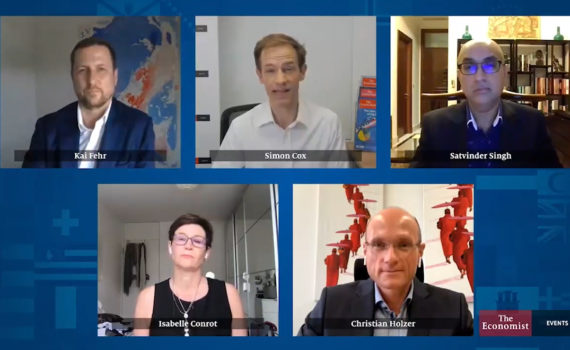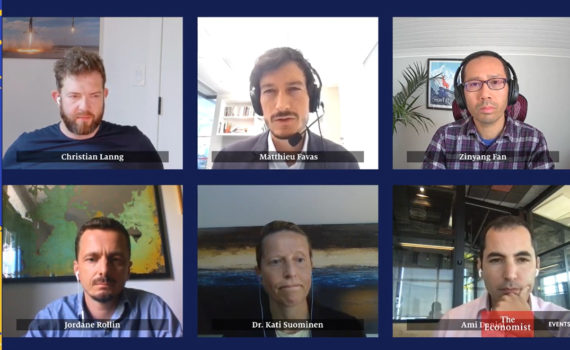Future-proofing supply chains for the new global economy


The 2020s are a decade of transformative change in trade. The challenges are significant, but so are the opportunities. As businesses chart a path forward in the wake of the Covid-19 pandemic, building stronger, more sustainable supply chains will be vital to success.
It is fast becoming clear that rebuilding trade and shoring up supply chains in the wake of the pandemic will take a collaborative approach from all actors in the ecosystem. However, ensuring success in the new world economy is both a challenge and an opportunity to be managed – and there is still some way to go.
According to Standard Chartered’s Critical indicators of sustainable supply chains, a new survey of over 900 global companies, approximately 90% confirmed that key indicators of supply chain success cover both resilience and sustainability, including the environmental soundness and transparency of direct suppliers and indirect or deep-tier suppliers, financial robustness, flexibility and adaptability, and collaboration and connectedness throughout the ecosystem.
However, for nearly two thirds of companies, real world performance lags the importance they place on meeting each of the indicators.
Speaking at Global Trade Virtual Week 2021, held between June 28 and July 2, three experts from Standard Chartered outlined the main areas of focus, and highlighted the enablers companies should consider adopting in addressing their supply chain gaps.
Environmental, social and governance (ESG) threats are intensifying, challenging the durability of existing business models and bringing reputational risks to the fore. Meanwhile, emerging regulatory actions are driving an overhaul of supply chain practices and presenting new compliance issues to be managed.
Multinational corporations surveyed by Standard Chartered say that supply chain emissions account for an average of 73% of their total emissions, and as they transition away from carbon, they expect to exclude 35% of their current suppliers, but gaining visibility into the environmental performance of supply chains remains a difficult task.
“We listened to our clients, and have created a financing toolkit to help companies and their supply chains meet sustainability goals,” says Kai Fehr, Global Head of Trade & Working Capital at Standard Chartered. The bank’s new sustainable trade finance proposition builds the Loan Market Association’s Green and Sustainability-linked Loan Principals into its trade financing framework, encouraging improved disclosure, reporting and focused investments towards a sustainable future.
“By working with our clients, we have developed a sustainability framework we are now introducing to industry groups to set global standards for our industry,” says Fehr.
By working with our clients, we have developed a sustainability framework we are now introducing to industry groups to set global standards for our industry.
Kai Fehr, Global Head of Trade & Working Capital
As part of the wider ESG agenda, governments around the world have been working to enhance climate change action and sustainable solutions. The Asean region is a leader in this area, with plans afoot to build solar energy powered infrastructure and managing plastic waste, as well as environmentally friendly solutions to meet rapidly growing consumption needs.
Investment in smart cities, electric transport and clean energy initiatives is opening up new opportunities for trade, and with numerous new free trade agreements (FTAs) being signed, a unique opportunity is opening up for corporates to access new markets and consumers.
However, European and North American companies looking to expand into the region must understand the opportunities and challenges pertaining to sustainability, and build capabilities and infrastructure for incorporating ESG considerations into local business operations alongside their banking partners.
“Governments have wholeheartedly recognised the importance of sustainability and social impact,” says Simon Cooper, CEO, Corporate, Commercial, & Institutional Banking and CEO, Europe & Americas at Standard Chartered. “For banks, this means helping ensure that clients are transitioning to net zero. It also means increasing our suite of sustainable finance products and bringing investors and our own balance sheet to bear where it’s needed.”
Governments have wholeheartedly recognised the importance of sustainability and social impact. For banks, this means helping ensure that clients are transitioning to net zero.
Simon Cooper, CEO, Corporate, Commercial & Institutional Banking and CEO, Europe & Americas
It is not just the Asean region that offers opportunities for expansion. As illustrated by the recent blockage of the Suez Canal, disruptive events in trade are fast becoming the rule rather than the exception, forcing manufacturers to reassess their supply chains to mitigate risk exposure and increase resilience.
Incorporating supply chain diversification as part of an overall strategy will allow companies to be more flexible and better anticipate, adapt to and recover from events in an uncertain environment. Companies should, however, adopt a holistic approach to risk diversification which extends beyond supply and production networks and also encompasses financial and operational resilience.
“Speaking to many of our clients, supply chain resilience and prioritisation is a top priority as lessons learned from geopolitical tension and impact from the pandemic,” says Fehr. “We meet clients today who are speaking to us for the first time about supply chain finance solutions, because they are looking for advice on how to address prioritisation within their procurement and how to mitigate dependencies and counterparty risk.”
The complexity of supply chains has created a major challenge: a lack of visibility, meaning that problems only come to light when the entire system comes to a standstill. Without a centralised system that can consistently pinpoint the location of a specific item as it travels along the chain, corporates are unable to identify bottlenecks, or track ESG risks.
What’s more, this lack of ability is hampering access to finance for smaller suppliers, since the data required to complete robust risk assessments simply isn’t available. As a result, the trade finance gap – which was already as high as US$1.5tn prior to Covid-19 – is now thought to have reached as much as US$3.4tn.
“The gap is acute in developing markets,” says Jordane Rollin, Head of Trade & Working Capital, Americas, at Standard Chartered. “This is largely due to the need for data. When you’re talking about SMEs, it’s a large scale operation to gather sufficient information to do credit assessments. To tackle this, we are working on using new sources of data from marketplaces and supplier networks.”
One promising and sometimes overlooked solution is blockchain, and Standard Chartered has invested in platforms such as Contour, which eliminate inefficient paper-based processes and improve transparency among transaction parties, enabling the provision of finance at even earlier stages for second and third-tier suppliers – so-called ‘deep-tier’ financing.
“It is really by combining and joining forces that we can democratise trade finance,” says Rollin. “We have been successful in collaborating with fintechs and regulators to come up with new solutions.”
The 2020s thus far have been characterised by crisis management in supply chains. As corporates now shift their focus to future growth, there is an urgent need to take a more holistic view of supply chains to make them more flexible and resilient.
Fortunately, the tools to achieve this already exist: from digital solutions that enable connectivity and collaboration, to sustainable supply chain finance programmes that incentivise ESG improvements and promote financial robustness.
After over 18 months of extraordinary disruption, the supply chain performance management playbook has changed. Beyond a focus on the cost of goods sold and increasing profit, going forward, resilience and agility will become more critical measures. For corporates to survive and thrive in this new environment, they must build resilient, sustainable, digitally enabled supply chains – or risk being left behind.

Simon Cooper, CEO, Corporate, Commercial, & Institutional Banking and CEO, Europe & Americas shares his views on the role of banks in the new world economy and enabling sustainability.

Leaders from Standard Chartered, ASEAN Economic Community, Roche and Siemens Energy discuss how to sustainably expand business and investment opportunities across ASEAN.

A panel discussion of experts from Standard Chartered, Tradeshift, Nextrade Group, Windward and the World Economic Forum explore the future of digital trade finance.